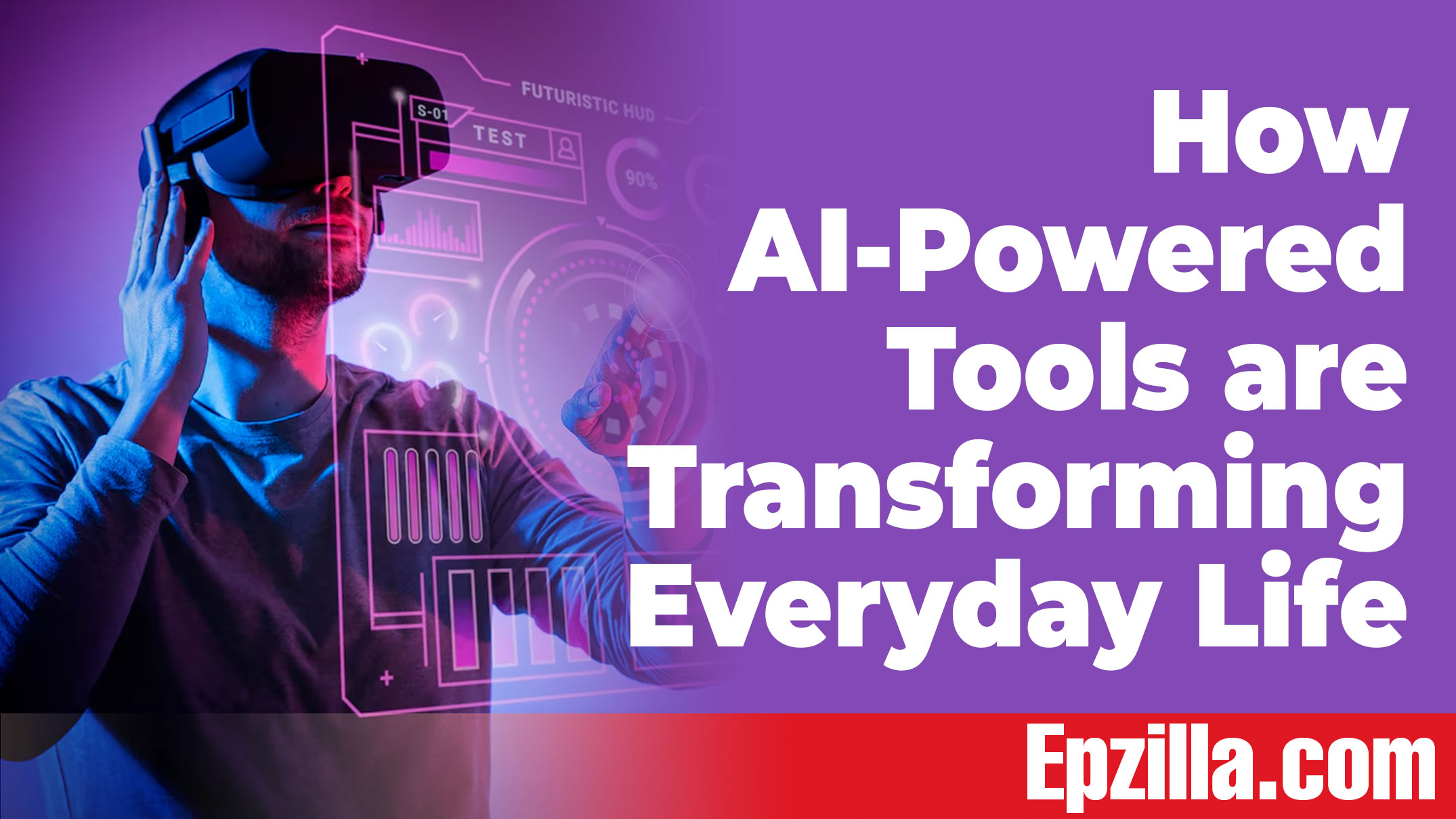Table of Contents
Introduction
Artificial Intelligence (AI) is no longer a concept confined to science fiction. It has gradually woven itself into the fabric of our daily lives, revolutionizing the way we interact with technology and each other. From the moment we wake up to the time we go to bed, AI-powered tools are at work, making our lives easier, more efficient, and often more enjoyable.
AI in Communication
Chatbots and Virtual Assistants
Gone are the days when customer service meant long waits on the phone. Chatbots and virtual assistants like Siri, Alexa, and Google Assistant have transformed how we communicate and obtain information. These AI-powered tools can answer questions, set reminders, control smart home devices, and even hold basic conversations. They use natural language processing to understand and respond to human speech, making our interactions with technology seamless and intuitive.
AI in Social Media Management
Managing social media platforms can be a daunting task, especially for businesses. AI tools help streamline this process by scheduling posts, analyzing engagement metrics, and even generating content. These tools can predict the best times to post, identify trending topics, and tailor content to specific audiences, ensuring a more effective and engaging online presence.
AI in Health and Wellness
Personalized Health Tracking
Wearable devices like smartwatches and fitness trackers have integrated AI to monitor our health in real-time. These devices track physical activity, heart rate, sleep patterns, and other vital signs, providing personalized feedback and recommendations. AI can analyze this data to suggest lifestyle changes, detect potential health issues early, and even connect users with healthcare professionals.
AI in Medical Diagnostics
AI has made significant strides in the field of medical diagnostics. Algorithms can now analyze medical images, such as X-rays and MRIs, with remarkable accuracy, often identifying conditions that might be missed by human eyes. This advancement speeds up diagnosis and allows for earlier and more effective treatments, ultimately saving lives.
AI in Education
Intelligent Tutoring Systems
Education is another area where AI is making a profound impact. Intelligent tutoring systems provide students with personalized learning experiences, adapting to their individual needs and pace. These systems offer tailored feedback, additional resources, and practice exercises, helping students grasp difficult concepts and improve their academic performance.
Personalized Learning Experiences
AI-powered educational platforms can analyze a student’s learning style and preferences, creating a customized curriculum that maximizes engagement and retention. This approach ensures that each student receives the support they need to succeed, making education more accessible and effective.
AI in Home Automation
Smart Home Devices
AI has brought unprecedented convenience to our homes. Smart home devices, such as thermostats, lighting systems, and security cameras, can be controlled remotely via smartphone apps. These devices learn our routines and preferences, adjusting settings automatically to enhance comfort and efficiency.
AI in Energy Management
AI helps manage energy consumption in homes, optimizing heating, cooling, and lighting to reduce energy bills and environmental impact. Smart grids use AI to balance supply and demand, ensuring efficient energy distribution and minimizing waste.
AI in Transportation
Autonomous Vehicles
Self-driving cars are one of the most talked-about applications of AI in transportation. These vehicles use a combination of sensors, cameras, and AI algorithms to navigate roads, avoid obstacles, and transport passengers safely. Autonomous vehicles promise to reduce traffic accidents, lower transportation costs, and provide mobility solutions for those unable to drive.
AI in Traffic Management
AI is also improving traffic management systems. Smart traffic lights and sensors collect and analyze data to optimize traffic flow, reduce congestion, and enhance road safety. These systems can adapt to real-time conditions, making urban transportation more efficient.
AI in Finance
Personal Finance Management
Managing personal finances can be challenging, but AI-powered tools are here to help. Apps like Mint and YNAB use AI to track spending, create budgets, and provide financial advice. These tools can analyze your financial habits, predict future expenses, and suggest ways to save money.
AI in Fraud Detection
AI plays a crucial role in detecting and preventing financial fraud. Machine learning algorithms analyze transaction patterns to identify unusual activities and potential threats. This real-time analysis helps financial institutions protect their customers and maintain trust.
AI in Shopping and Retail
Personalized Shopping Experiences
Online shopping has become more personalized thanks to AI. E-commerce platforms use AI to recommend products based on browsing history, previous purchases, and user preferences. This tailored shopping experience increases customer satisfaction and boosts sales.
AI in Inventory Management
Retailers also benefit from AI in inventory management. AI systems can predict demand, optimize stock levels, and reduce waste. These systems ensure that products are available when customers need them, improving overall efficiency and profitability.
AI in Entertainment
AI in Content Creation
AI is revolutionizing content creation in the entertainment industry. Tools like GPT-3 can generate text, music, and even visual art, providing creators with new ways to produce content. This technology helps streamline the creative process and opens up new possibilities for storytelling and artistic expression.
Personalized Entertainment Recommendations
Streaming services like Netflix and Spotify use AI to recommend movies, shows, and music based on user preferences. These algorithms analyze viewing and listening habits to suggest content that users are likely to enjoy, enhancing their overall experience.
AI in Security
Home Security Systems
AI-powered home security systems offer advanced features like facial recognition, motion detection, and real-time alerts. These systems provide enhanced protection by distinguishing between regular activities and potential threats, ensuring the safety of your home and loved ones.
Cybersecurity Enhancements
AI is also crucial in cybersecurity, where it helps detect and prevent cyberattacks. Machine learning algorithms analyze network traffic to identify suspicious activities and vulnerabilities, providing real-time defense against threats and enhancing digital security.
AI in Work and Productivity
AI in Project Management
AI tools are transforming project management by automating routine tasks, tracking progress, and predicting project outcomes. These tools can analyze team performance, identify potential issues, and provide insights to improve productivity and efficiency.
AI for Routine Task Automation
Many routine tasks, such as data entry and scheduling, can now be automated using AI. This automation frees up time for more strategic and creative work, allowing employees to focus on tasks that require human expertise and judgment.
Ethical Considerations of AI
Privacy Concerns
With the widespread use of AI comes the need to address privacy concerns. AI systems often require access to personal data, raising questions about data security and user consent. It’s essential to establish robust privacy policies and ensure transparent data practices.
Job Displacement
AI’s ability to automate tasks has sparked fears of job displacement. While AI can enhance productivity, it’s crucial to consider its impact on the workforce and develop strategies to retrain and support displaced workers.
Future of AI in Everyday Life
Emerging AI Technologies
The future of AI holds exciting possibilities. Emerging technologies, such as quantum computing and advanced neural networks, promise to push the boundaries of what AI can achieve. These innovations could lead to even more sophisticated and intuitive AI tools.
Potential Impact on Society
AI’s potential impact on society is immense. It has the power to address global challenges, such as climate change and healthcare disparities, by providing innovative solutions. However, it’s crucial to approach AI development with a focus on ethical considerations and inclusivity to ensure a positive and equitable future.
Conclusion
AI-powered tools are undeniably transforming everyday life, making tasks easier, enhancing experiences, and driving innovation across various sectors. As AI technology continues to evolve, its influence on our daily lives will only grow. Embracing these advancements while addressing the associated challenges will pave the way for a future where AI enhances










